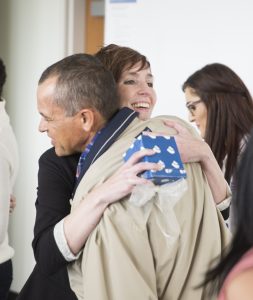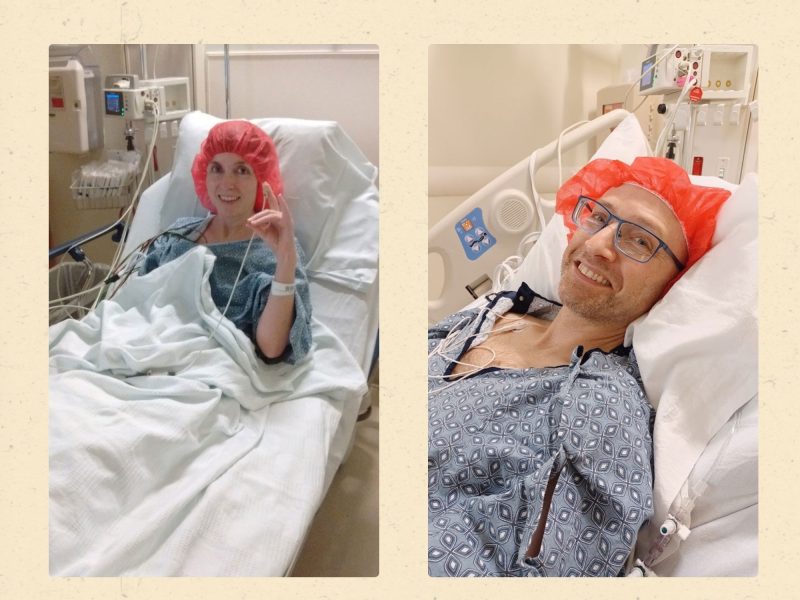For many couples, deciding on weekend plans or what to have for dinner can be a challenge—but for living donors Chris and Julie, even the major life choices come naturally.
“I was the first up,” said Julie, smiling. “I had seen a news article about a gentleman who donated years ago. He said he had an extra kidney and simply decided to donate it. I guess it stuck with me, because I thought about it for years until I finally worked up the courage to call Duke and ask about their living donor program.”
After that, the process took on a life of its own, and Julie soon broke the news to her friends and family. “I think that most people were probably pretty surprised,” Julie recalled. “It came out of the blue for everybody, except for Chris, who knew I was thinking about it.”
Julie’s husband, Chris, admits to being a ball of nerves following her decision—but attending Duke’s initiation program alongside her helped to alleviate much of his concern.
“At first I wondered about the potential risk to her, but talking to those folks really helped a lot,” said Chris. “They go through your medical history and do all of the testing. They have it set up so that there is a specific person on the team that acts as an advocate for the donor, so it’s very much focused on the donor’s health and safety. They understood that Julie was choosing to do this voluntarily and ensured that both she and I felt fully informed and comfortable with the decision. That really went a long way in instilling confidence.”
Today, Duke is part of a national kidney exchange network, allowing them to find matches beyond the local region, which increases the chances of finding a compatible match. When Julie was matched back in 2017, the process was more local—but as a single altruistic donor, she was able to kick-start a chain of kidney donations where multiple patients and donors were linked. The program enabled her kidney to go to a middle-aged man in 2017—acting as the “trailblazer” and inspiration for Chris, who ended up anonymously donating on Aug. 20, 2023, kicking off his own “kidney chain” of five people.
“It never even crossed my mind that Chris would do it, too,” said Julie. “We both work for the state, which worked out great—not many people know this, but they offer six weeks of paid organ donation leave for any state employee. Because of this, neither one of us had to use any of our accrued vacation time or sick leave. It’s a great benefit.”
For Chris, the COVID-19 pandemic played a role in pushing him toward donation. He reflected on wanting to do something “outside of himself” and help someone in need. He had also been deeply touched by witnessing Julie meet her recipient during a get-together orchestrated by Duke for the donors and recipients in her chain.

“I got to see the direct impact of her donation, so that was inspirational,” said Chris. “The meeting was kind of a joyous event. It wasn’t just a celebration of Duke, it was really about getting the story out that people do this, and you can, too.”
For Julie, the experience of meeting the man who received her kidney was deeply moving. “All three donors in my chain were at Duke at the same time and we met our recipients all at once,” said Julie. “I met my recipient and his family and everyone else who had donated on behalf of their loved one. I was really excited to see everyone and glad to see that my recipient was doing well. It was really nice to be able to give him a hug.”

Chris, on the other hand—a self-professed introvert—has been happy to let his kidney “fly free” without knowing any specific details about who received it.
“I opted to not share info, to just try and do it more anonymously,” Chris said. “The only thing I do know is that it went to someone in Richmond, VA, and that the person is doing well. So that’s enough for me.”
Today, Julie and Chris have no regrets. Aside from being cautious with certain medications, their daily lives and routines remain unchanged.
“It’s something we did, and I’m glad we did it,” said Julie. “It’s kind of like we made a donation in cash, just in kidney form. If you have an extra kidney, just give it to somebody—that’s truly how I feel. There’s no harm in just inquiring if it’s something you think you want to do.”
Over 100,000 people in the United States are waiting for a lifesaving transplant. Whether you choose to be a living donor or a donor after death, you can make a difference. Register your decision to be an organ, eye, and tissue donor today at honorbridge.org/registerme




